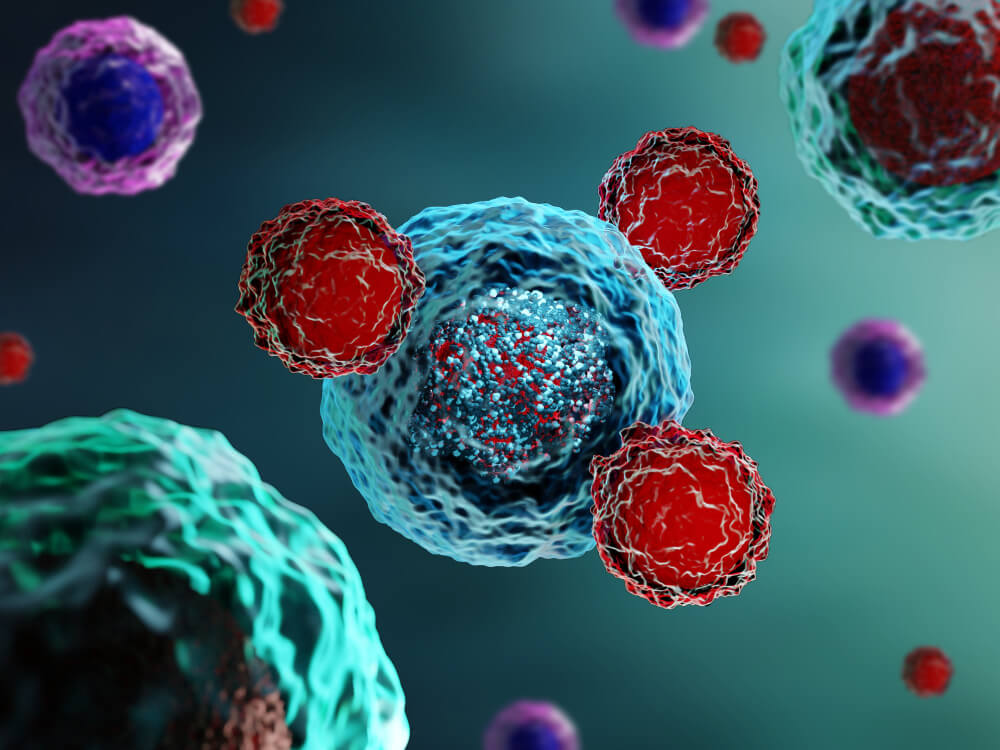Immunotherapy for cancer is a form of treatment that uses the body’s immune system to combat the disease. Today, immunotherapy is being applied to a wide range of cancers, often in combination with other agents, and clinical trials are exploring ways of improving and expanding its effectiveness.
A particularly promising form of immunotherapy, known as immune checkpoint inhibition, uses antibodies to block proteins on cancer cells, such as CTLA4, PD-L1, PD-1, and LAG-3, that impede an immune system attack on the cells. The antibody therapies allow such an attack to proceed.
Immunotherapy has been approved for the treatment of the following cancers:
- Bladder cancer
- Breast cancer
- Cervical cancer
- Colorectal cancer (subset)
- Esophageal cancer
- Head and neck cancer
- Kidney cancer
- Liver cancer
- Lung cancer
- Lymphoma (Hodgkin’s)
- Melanoma
- Merkel cell carcinoma
- Prostate cancer
- Squamous cell carcinoma of the skin
Not all patients with these cancers are eligible for immunotherapy. A variety of factors — the genetic makeup of the tumor cells, how far the cancer has advanced, and whether it has responded to previous treatments, for example — determines if and when it may be used as part of standard treatment.

Bladder cancer
Patients with early-stage, moderate- to high-grade (fairly fast-growing) tumors often receive a vaccine consisting of a weakened, live bacterium called bacillus Calmette-Guérin (BCG). The vaccine reduces the risk of bladder cancer recurrence by sparking an immune attack on the bacteria as well as nearby cancer cells. Several immune checkpoint inhibitors have been approved for patients with advanced bladder cancer including:
- atezolizumab
- avelumab
- durvalumab
- nivolumab
- pembrolizumab.
Breast cancer
Some patients with advanced metastatic triple-negative breast cancer may receive the immune checkpoint inhibitor atezolizumab or pembrolizumab in combination with a chemotherapy drug.
Ongoing clinical trials are investigating immunotherapies in other breast cancer subtypes as well as in early-stage disease.
Cervical cancer
The checkpoint inhibitor pembrolizumab has been approved for some patients with advanced cervical cancers that express the PD-L1 protein.
Colorectal cancer
Checkpoint inhibitors may be used in patients with advanced colorectal cancer classified as “MSI-high,” or any cancer with MSI high. Detection of DNA errors and mutations caused by high microsatellite instability (MSI-H) and deficient mismatch repair (dMMR) helps guide eligibility for immunotherapy.
The immune checkpoint inhibitor pembrolizumab may be used as a first-line therapy.
A combination of two immune checkpoint inhibitors, nivolumab and ipilimumab, is also approved for adults and children whose cancer has progressed after chemotherapy.
Esophageal cancer
The checkpoint inhibitor pembrolizumab has been approved for some patients with PD-L1-positive gastroesophageal cancer (meaning their tumor cells carry the PD-L1 protein, which helps the cells avoid an immune attack) or squamous cell carcinoma of the esophagus after patients exhaust prior lines of therapy.
Pembrolizumab is also used to treat subsets of patients with advanced stomach cancer that tests positive for the PD-L1 protein.
The checkpoint inhibitor nivolumab in combination with chemotherapy, and nivolumab in combination with ipilimumab, are approved as first-line treatment for patients with advanced or metastatic esophageal squamous cell carcinoma (ESCC).
Head and neck cancer
Immunotherapy is less invasive than some surgeries, bringing a new form of treatment to patients diagnosed with head and neck cancers. The checkpoint inhibitors nivolumab and pembrolizumab have been approved for some patients with advanced head and neck cancer.
Kidney (renal) cancer
Immune system-stimulating substances called cytokines have been used for more than a decade to treat kidney cancer. The cytokines interleukin-2 and interferon-alpha cause kidney cancers to shrink in about 10-20% of patients, with lasting remissions in some of them.
More options for treating kidney cancer are now available due to the approval of immune checkpoint inhibitors – which are now an essential part of the overall treatment strategy for patients with advanced kidney cancer – including:
- checkpoint inhibitors avelumab, nivolumab, and pembrolizumab in patients with advanced cancer
- a combination of nivolumab and ipilimumab, a drug targeting the CTLA-4 checkpoint protein, for some patients with advanced kidney cancer.
Leukemia
Immunotherapies have become especially prominent in the treatment of leukemia and other blood-related diseases and cancers. A stem cell transplant from a compatible donor is considered a form of immunotherapy because the donated blood-making cells endow patients with a new immune system that is better able to fight the disease.
Another immune system-based strategy is known as adoptive cell therapy, which treats patients with an infusion of CAR T cells, genetically enhanced T cells that mount a powerful attack on tumor cells.
Other T-cell therapies, known as bispecific T cell engager (BiTE) and dual-affinity re-targeting (DART) antibodies, have also shown effectiveness against certain types of leukemia.
The immune-signaling protein interferon alfa-2a is approved for subsets of patients with hairy cell leukemia and Philadelphia chromosome-positive chronic myeloid leukemia. Interferon alfa-2b is approved for some patients with hairy cell leukemia and aggressive non-Hodgkin lymphoma.
Liver cancer
Recently, the standard of care for patients with advanced hepatocellular carcinoma has been transformed by immune checkpoint inhibitor therapies.
A combination of the immune checkpoint inhibitor atezolizumab plus the anti-vascular endothelial growth factor (VEGF) antibody bevacizumab was shown to offer improved overall survival when given to patients as their first treatment. In addition, the immune checkpoint inhibitors tremelimumab and durvalumab in combination have shown improved outcomes in adult patients with inoperable hepatocellular carcinoma (uHCC).
Immunotherapy treatments for advanced liver cancer may also include the checkpoint inhibitors nivolumab, ipilimumab, and pembrolizumab.
Adoptive cell therapies such as cytokine-induced killer cells (CIKs) and natural killer (NK) cell-based adoptive therapies are also under investigation.
Lung cancer
For advanced and metastatic lung cancer, many immunotherapy options are now available. Immunotherapy may be used as a primary or secondary line of therapy either alone (checkpoint inhibitor therapy only) or in combination with other treatments such as radiation, chemotherapy, and/or targeted therapy. PD-L1 testing may indicate the most appropriate checkpoint inhibitor immunotherapy.
Several checkpoint inhibitors — including atezolizumab, nivolumab, ipilimumab, and pembrolizumab — may be used in treating patients with advanced non-small cell lung cancer.
Lymphoma
The checkpoint inhibitors nivolumab and pembrolizumab are used in the treatment of patients with classical Hodgkin lymphoma, and interferon alfa-2b is approved for some patients with follicular lymphoma.
Adoptive cellular therapy (T-cell therapy) in the form of chimeric antigen receptor (CAR T-cell) therapy is approved for some patients with non-Hodgkin lymphoma, and tisagenlecleucel is a CAR T-cell therapy for children and young adults with acute lymphoblastic leukemia.
Melanoma
Immune checkpoint inhibitors had their first breakthrough in metastatic melanoma. Today, a range of inhibitors are used to treat subsets of patients with advanced melanoma, including:
- ipilimumab
- nivolumab’pembrolizumab
- relatimab
(Nivolumab and ipilimumab are also used together in some patients.)
Cytokine therapies including aldesleukin, interferon alfa-2b, and peginterferon alfa-2b are standard therapies for subsets of patients with melanoma.
Non-melanoma skin cancer
The checkpoint inhibitors avelumab and pembrolizumab are used to treat some groups of patients with advanced Merkel cell carcinoma. The checkpoint inhibitor cemiplimab is approved for some patients with advanced cutaneous squamous cell carcinoma.
Two drugs known as immune adjuvants — imiquimod and poly ICLC — that increase the strength of the immune response are approved for some patients with basal cell carcinoma and squamous cell carcinoma, respectively. These drugs enhance the immune system’s natural response to these cancers.
Prostate cancer
Sipuleucel-T, a therapeutic vaccine made by stimulating patients’ own immune cells to target the PAP protein on prostate cancer cells, may be used to treat some patients with advanced prostate cancer.
The checkpoint inhibitor pembrolizumab is also approved for some patients with advanced prostate cancer classified as “MSI-high.”
About the Medical Reviewer
 Dr. Stephen Hodi, Jr., MD, is the director of the Melanoma Center and the Center for Immuno-Oncology at Dana-Farber Brigham Cancer Center and Professor of Medicine at Harvard Medical School. He received his MD degree from Cornell University Medical College in 1992. Dr. Hodi competed his postdoctoral training in Internal Medicine at the Hospital of the University of Pennsylvania, and medical oncology training at Dana-Farber Cancer Institute where he joined the faculty in 1995. His research focuses on gene therapy, the development of immune therapies, and first into human studies for malignant melanoma. Dr. Hodi is a member of the National Comprehensive Cancer Network, the American Society of Clinical Oncology, the Eastern Cooperative Oncology Group Melanoma Committee, the International Society for the Biological Therapy of cancer, and a founding member of the Society for Melanoma Research. Srinika Ranasinghe, PhD, is the associate director of the Center for Immuno-Oncology at Dana-Farber Cancer Institute.
Dr. Stephen Hodi, Jr., MD, is the director of the Melanoma Center and the Center for Immuno-Oncology at Dana-Farber Brigham Cancer Center and Professor of Medicine at Harvard Medical School. He received his MD degree from Cornell University Medical College in 1992. Dr. Hodi competed his postdoctoral training in Internal Medicine at the Hospital of the University of Pennsylvania, and medical oncology training at Dana-Farber Cancer Institute where he joined the faculty in 1995. His research focuses on gene therapy, the development of immune therapies, and first into human studies for malignant melanoma. Dr. Hodi is a member of the National Comprehensive Cancer Network, the American Society of Clinical Oncology, the Eastern Cooperative Oncology Group Melanoma Committee, the International Society for the Biological Therapy of cancer, and a founding member of the Society for Melanoma Research. Srinika Ranasinghe, PhD, is the associate director of the Center for Immuno-Oncology at Dana-Farber Cancer Institute.